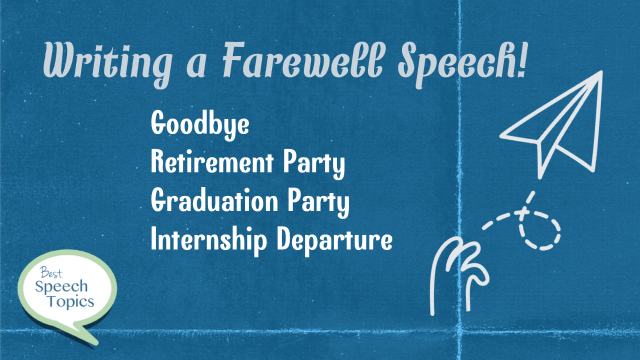The Art of Writing a Farewell Speech
A Comprehensive Guide

Saying goodbye is never easy, especially when it involves delivering a farewell speech. Whether it's for colleagues, classmates, or friends, a well-crafted speech can leave a lasting impression. In this blog post, we will guide you through the process of writing a farewell speech, providing tips and techniques to make your words meaningful and memorable. We'll cover everything from understanding the purpose of a farewell speech to selecting the right tone and organizing your thoughts effectively.
Table of Contents:
- Understanding the Purpose of a Farewell Speech
- Getting Started: Selecting the Right Tone
- Organizing Your Thoughts: Structure and Flow
- Crafting the Perfect Introduction
- Sharing Personal Experiences and Memories
- Offering Well-Wishes and Gratitude
- Adding a Personal Touch: Quotes and Poems
- Tips for Delivering a Farewell Speech
- Conclusion
We provide an article with a number retirement farewell speech samples by profession for inspiration, as well as tips for the particular professions such as teaching, military, and others.
Understanding the Purpose of a Farewell Speech
A farewell speech serves several purposes. It's a chance to express gratitude, share memories, and bid farewell to someone or a group as they embark on a new journey. The speech should be heartfelt, sincere, and memorable, ensuring that the person or people you're addressing feel appreciated and cherished.
An excellent farewell speech will bring closure to a particular phase of life, whether it's a job, school, or a personal relationship. It allows both the speaker and the audience to reflect on the past and embrace the future.
In addition, the sincere expression of goodbye can strengthening bonds and connections between the speaker and the person or group being addressed, leaving a lasting impression and fostering ongoing relationships. And at times, the well-crafted farewell speech will inspire and motivate others, encouraging them to pursue their own goals, cherish their relationships, and make the most of their opportunities.
Step-by-Step Guidance
For Writing a Farewell Speech
Getting Started: Selecting the Right Tone
When writing a farewell speech, the tone of your speech should reflect the nature of the occasion and the relationship you share with the person or group you're addressing. Maintain a respectful and professional tone for a more formal setting, such as a colleague's retirement. In contrast, a lighter, more casual tone may be appropriate for a friend's going-away party.
Organizing Your Thoughts: Structure and Flow
A well-structured farewell speech is easy to follow and keeps the audience engaged. Consider the following outline when organizing your thoughts:
a. Introduction: Capture the audience's attention and set the tone.
b. Gratitude: Thank your listeners for their support and friendship.
c. Memories: Share personal stories and experiences.
d. Well-wishes: Offer best wishes for the future.
e. Personal touch: Include a quote, poem, or anecdote of advice.
Crafting the Perfect Introduction of a Farewell Speech
To craft the perfect introduction when writing a farewell speech, consider the following tips:
- Start with a warm greeting: Begin your speech by addressing the audience in a friendly and welcoming manner. Use an appropriate salutation, such as "Ladies and gentlemen," "Dear friends and colleagues," or "Dear [specific group]."
- Set the context: Briefly explain the occasion and the reason for your farewell speech. The brief explanation helps the audience understand the context and purpose of your speech and may avoid confusion for those who do not know the circumstance.
- Capture attention: Use a hook or an engaging statement to capture your audience's attention. The hook could be a thought-provoking quote, a rhetorical question, or an interesting anecdote related to the person or group you're addressing.
- Establish the tone: Set the tone for the rest of your speech in the introduction. The tone should be appropriate for the occasion and your relationship with the person or group you're addressing. Depending on the situation, it could be formal, casual, heartfelt, or humorous.
- If not too formal for the situation, provide an overview: Give a brief overview of the content of your speech, highlighting the main points you'll be covering. The foreshadowing helps your audience understand what to expect and creates a sense of anticipation. For example, "I want to share my love, let you know my plans, and leave you with insights from my time here at [my job, etc.]."
- Be concise: Keep your introduction brief and to the point. Aim to capture your audience's attention quickly and set the stage for the rest of your speech without taking too much time.
Remember that the introduction sets the tone for your farewell speech, so make sure it is engaging, clear, and relevant to your audience.
Sharing Personal Experiences and Memories
One of the most effective ways to write a memorable farewell speech is by sharing personal stories and experiences. Reflect on the time spent with the person or group you're addressing and select anecdotes that showcase your bond. Be sure to keep the stories relevant and appropriate for the occasion.
Sample Personal Experience by a Departing Employee
"During my early days at the company, I was a bit overwhelmed with the new environment and responsibilities. I remember my first big project; I was working late hours, and my nerves were getting the better of me. One evening, as I was trying to make sense of the project, our team lead, Jane, walked by and noticed the struggle in my eyes.
Instead of walking away, Jane sat down with me and spent the next hour patiently explaining the details, offering invaluable insights, and even sharing her own experiences when she was new to the team. That conversation not only made the project more manageable but also helped me realize that I was part of a supportive and caring work family.
That day, I learned the importance of being there for one another, and it's a lesson I've carried with me ever since. Jane's kindness and mentorship truly made a difference in my professional journey here, and I will always be grateful for that."
Offering Well-Wishes and Gratitude
Express your gratitude for the experiences and relationships you've formed together when writing a farewell speech. Thank the person or group for their support, friendship, or mentorship. Additionally, offer your best wishes for their future endeavors, wishing them success and happiness.
Sample Offer of Gratitude to a Manager in a Company
"As I stand before you today, I want to express my deepest gratitude to you, Chuck, for the incredible support, mentorship, and guidance you've provided during my time in the industrial engineering department. Working under your leadership in the automobile manufacturing division has been a true privilege, and I am truly grateful for the opportunity to have learned from you and contributed to the team's success.
As I embark on my new journey, I would like to extend my warmest well-wishes to you and your continued success in leading this remarkable team. I have no doubt that you will keep steering the department to even greater heights, and I look forward to hearing about your future accomplishments. I hope that our paths cross again in the future, and until then, please know that I will always cherish the time we spent together and the impact you've had on my life, both professionally and personally. Thank you, Chuck, and best of luck to you in all your endeavors."
Adding a Personal Touch: Quotes and Poems
Incorporating a meaningful quote, poem, or anecdote of advice when writing a farewell speech can add depth and impact to your speech. Choose something that resonates with your relationship or the occasion, and use it to emphasize your message.
A sample poem from a CEO to her employees to express thankfulness for her time serving as the head of her non-profit serving children as a personal touch for her farewell speech.
In unity, we thrived,
Our nonprofit touched young lives,
Grateful, I depart.
With love and strength, you'll persevere,
Children's dreams live strong,
Farewell, dear friends, our bond lives on,
Together, we've transformed.
Tips for Delivering a Farewell Speech
- Keep it concise: Aim for a speech length of 3-5 minutes.
- Practice beforehand: Rehearse your speech several times to become comfortable with the content and delivery.
- Speak from the heart: Be genuine and sincere in your gratitude and farewell.
- Maintain eye contact: Engage with your audience by making eye contact throughout your speech.
- Use visual aids: If appropriate, consider using photos or slides to enhance your speech and make it more engaging.
- Manage your emotions: It's natural to feel emotional during a farewell speech but maintain composure to communicate your message effectively.
- Speak clearly and confidently: Project your voice, enunciate your words, and maintain a steady pace to ensure your audience can easily follow along.
Conclusion
Writing a farewell speech is an opportunity to leave a lasting impression on those you care about as they embark on a new chapter in their lives.
By understanding the purpose of the speech, selecting the right tone, organizing your thoughts effectively, and incorporating personal experiences, well-wishes, and a personal touch, you can create a heartfelt and memorable farewell speech. As you conclude your speech, summarize the key points and offer suggestions for further reflection or exploration. Encourage your audience to cherish the memories you've shared and look forward to the future with hope and enthusiasm.
With this comprehensive guide, you're now well-equipped to craft and deliver an impactful farewell speech. We hope these tips and techniques help you create a memorable send-off for your friends, colleagues, or classmates. Good luck, and may your words leave a lasting impression on those you hold dear.
Review several retirement farewell speech samples for various professions for more guidance and examples. Readers will find tips that are unique to each profession.
- Home
- Writing a Speech
- Writing a Farewell Speech



